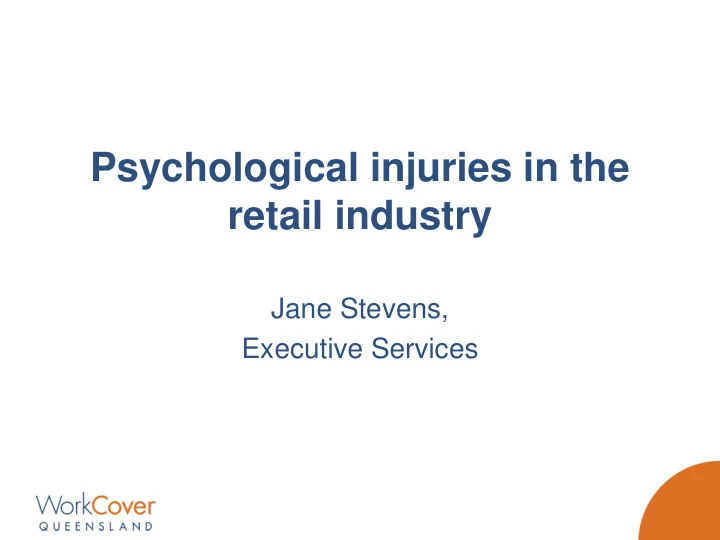

Psychological injuries in the retail industry Jane Stevens, Executive Services
Who are we?
What is a psychological injury? Psychological injuries can either be primary psychological injuries or secondary psychological injuries which occur after a physical injury Primary psychological injuries must have employment as the major significant contributing factor Secondary psychological injuries develop as a sequelae to a physical injury Common secondary psychological conditions include depression, anxiety-related disorders, adjustment disorders or substance dependency
Retail injury trends • Average cost of psychological claims is 2x the cost of a physical claim Average cost • Average cost of a physical claim with a secondary psychological claim is 6x the cost of a physical claim Total cost to • Total cost to the retail industry of over $6.5 m each year industry
What are the implications for RTW? Final RTW % WorkCover Queensland data – retail industry 2016–2017 120.00% 97.96% 100.00% 81.80% 80.00% 60% 60.00% 40.00% 20.00% 0.00% Physical – no psych Primary psych Secondary psych
What is our role? The evolution of our claims processing and management model A flexible, tailored approach to determining psychological injury claims What is best? How can we help? Limiting the possible negative effects of seeking compensation
WorkCover Employer Worker
Secondary psychological injury – what can contribute? Worker factors Employer factors Not knowing their treatment Placing blame for accident or RTW program Failing to involve worker about Concerns of job security current events when away from and/or fear of re-injury work Inability to cope with pain or Casting judgement about a dependency on medications person’s ability to function Impact on family and Lack of, or poor communication activities of daily living (initial and ongoing (socially or at home) communication) Long periods of isolation at Employer’s fear of re-injury (not home, feeling removed from offering RTW duties) work environment
What can we do to assist in prevention and minimise the impact? Early intervention Understand the tools and support available Leadership, culture and frontline supervisors
Early intervention Early intervention = early treatment + timely support and acknowledgment WorkCover involvement when the claim is lodged Large employers and small employers – can provide support in different ways Early intervention programs are designed to provide immediate diagnosis, treatment and rehabilitation for a worker Best practice employers – regular contact with workers and make them feel supported and welcome on their return to work
What does the research tell us?
Biopsychosocial model of care Source: SuperFriend “Taking action – a framework for managing psychological insurance claims”
Leadership, culture and RTW • Early recognition of • Supervisors and co-workers • Supervisors can make a positive impact on the problems, intervention and need to understand the support enable a supervisor injured person’s limitations return to the work thereby creating a better work to be central to a successful – supportive culture return to work environment and reducing • A strong culture of safety claim costs • Particularly important for and trust ensures those employees returning employees are • A supervisor is in a key to work following an injury comfortable and position to observe confident reporting changes in behaviour and incidents, injuries and near physical, mental or personal misses concerns Frontline Leadership Culture supervisors
Leading the way Work with them to Place them develop a suitable with supportive Early, regular duties program that colleagues to and meaningful they feel comfortable assist with their communication with to encourage return to work return to work during injury Support them, Assure them they monitor their won't lose their job progress and make because of their changes if injury necessary
worksafe.qld.gov.au 1300 362 128
Recommend
More recommend